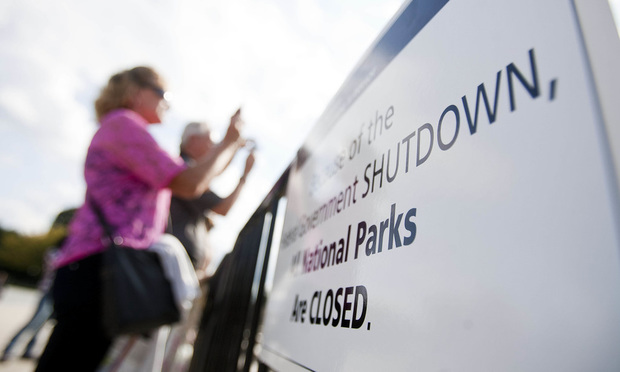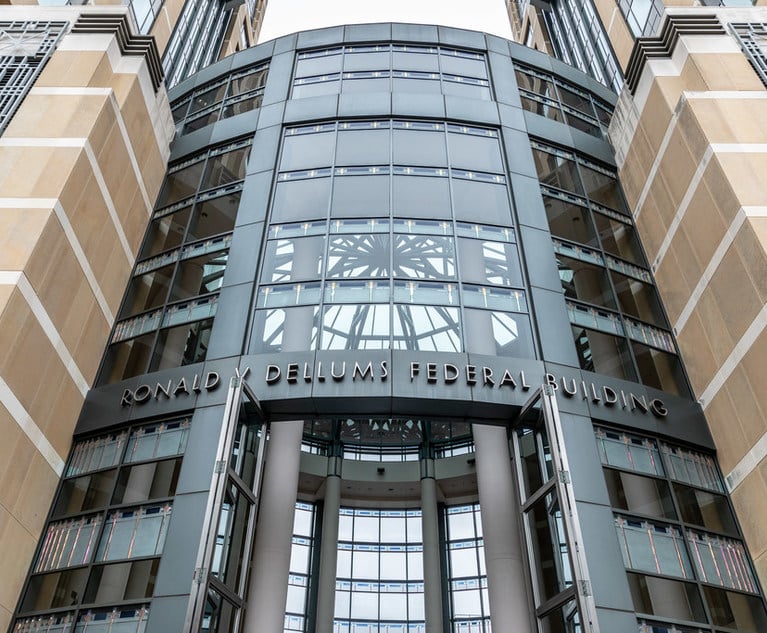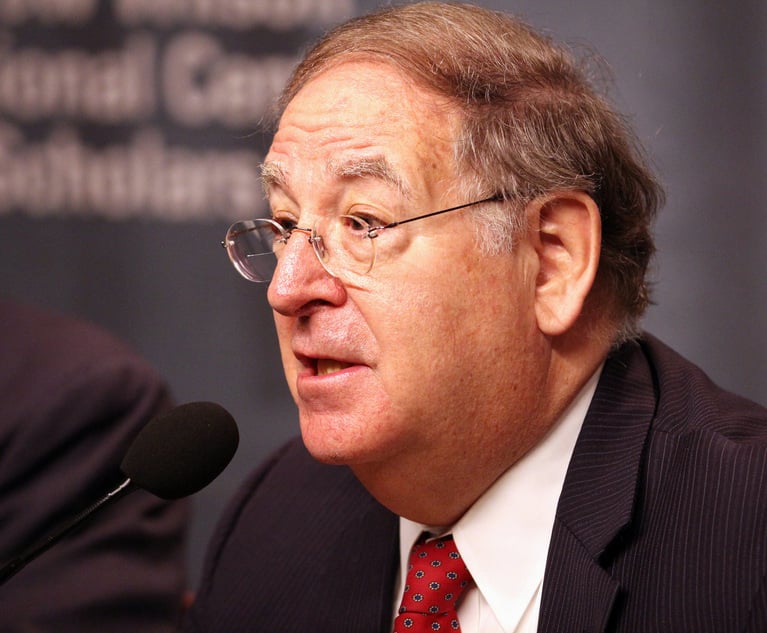Government Shutdown? SCOTUS Is Unfazed.
A government-wide shutdown is a "non-event," retired Supreme Court clerk William Suter said in an interview Saturday. "The court marches on."
January 20, 2018 at 05:55 PM
3 minute read
 The Lincoln Memorial was closed to visitors during the 2013 government shutdown. Photo: Diego M. Radzinschi / NLJ
The Lincoln Memorial was closed to visitors during the 2013 government shutdown. Photo: Diego M. Radzinschi / NLJ No matter what happens next with the federal government shutdown, the U.S. Supreme Court will be open for business Monday, adhering to its tradition of ignoring the vicissitudes of the other branches of government.
For an institution that almost never shuts down—even when blizzards shutter other federal buildings—a government-wide shutdown is a “non-event,” retired Supreme Court clerk William Suter said in an interview Saturday. “The court marches on.”
Fortuitously, Monday is the last session of the high court until February 20, and it will consist only of opinion announcements, orders and the swearing-in of new members of the Supreme Court bar. There are no oral arguments. So the impact would be minimal even if the court were to join other entities in shutting down.
But the court almost never closes when other agencies do. The late Chief Justice William Rehnquist, who was a meteorologist in the military during World War II, shrugged at blizzards and refused to cancel arguments.
“It was eerie,” Suter said, remembering a session when the lawyers arguing a case, and almost no one else, made it to the court. “There were only about 20 people in the audience.”
Oral arguments were not delayed during the 2013 government shutdown. Former acting U.S. solicitor general Neal Katyal recalled earlier arguments on snowy days. “I think of the court the way I think of my elementary school in Chicago; it never shuts down.”
In a press release issued Saturday, the Administrative Office of the U.S. Courts said the judiciary, using fees and other resources, had enough money to stay open until February 9. The Supreme Court, which has a budget separate from the rest of the federal courts, may draw on similar resources until the shutdown ends.
A court spokesperson confirmed the justices will convene Monday.
Also possibly lessening the impact of the shutdown on the Supreme Court is the fact the court last November began allowing lawyers to file briefs and other documents electronically.
Chief Justice John Roberts Jr. noted in his end-of-the-year annual report last month that federal courts are deemed by statute (28 U.S.C. 452) to be open at all times for filings and other official business.
“On fair weather days, it is easy to take that provision for granted,” Roberts wrote. Referring to recent natural disasters that affected court operations, Roberts added, “When disaster strikes, it can be honored only through the tireless efforts of judges, court employees, Administrative Office staff, and the many friends of the judiciary.”
Read more:
Federal Courts Have 3-Week Lifeline if Government Shuts Down
Shutdown Isn't Stopping the SG's Office
This content has been archived. It is available through our partners, LexisNexis® and Bloomberg Law.
To view this content, please continue to their sites.
Not a Lexis Subscriber?
Subscribe Now
Not a Bloomberg Law Subscriber?
Subscribe Now
NOT FOR REPRINT
© 2025 ALM Global, LLC, All Rights Reserved. Request academic re-use from www.copyright.com. All other uses, submit a request to [email protected]. For more information visit Asset & Logo Licensing.
You Might Like
View All
Read the Document: DOJ Releases Ex-Special Counsel's Report Explaining Trump Prosecutions
3 minute read
Crypto Exchange’s ‘Meteoric Rise’ Leads to Nationwide Class Action Trend
4 minute read
Veteran Federal Trade Law Enforcer Joins King & Spalding in Washington
4 minute read
'Thoughtful Jurist': Maryland US District Senior Judge Messitte Dies After Short Illness
4 minute readTrending Stories
- 1Pa. Superior Court: Sorority's Interview Notes Not Shielded From Discovery in Lawsuit Over Student's Death
- 2Kraken’s Chief Legal Officer Exits, Eyes Role in Trump Administration
- 3DOT Nominee Duffy Pledges Safety, Faster Infrastructure Spending in Confirmation Hearing
- 4'Younger and Invigorated Bench': Biden's Legacy in New Jersey Federal Court
- 5'Every Single Judge on Board': First-Impression Case Revived
Who Got The Work
J. Brugh Lower of Gibbons has entered an appearance for industrial equipment supplier Devco Corporation in a pending trademark infringement lawsuit. The suit, accusing the defendant of selling knock-off Graco products, was filed Dec. 18 in New Jersey District Court by Rivkin Radler on behalf of Graco Inc. and Graco Minnesota. The case, assigned to U.S. District Judge Zahid N. Quraishi, is 3:24-cv-11294, Graco Inc. et al v. Devco Corporation.
Who Got The Work
Rebecca Maller-Stein and Kent A. Yalowitz of Arnold & Porter Kaye Scholer have entered their appearances for Hanaco Venture Capital and its executives, Lior Prosor and David Frankel, in a pending securities lawsuit. The action, filed on Dec. 24 in New York Southern District Court by Zell, Aron & Co. on behalf of Goldeneye Advisors, accuses the defendants of negligently and fraudulently managing the plaintiff's $1 million investment. The case, assigned to U.S. District Judge Vernon S. Broderick, is 1:24-cv-09918, Goldeneye Advisors, LLC v. Hanaco Venture Capital, Ltd. et al.
Who Got The Work
Attorneys from A&O Shearman has stepped in as defense counsel for Toronto-Dominion Bank and other defendants in a pending securities class action. The suit, filed Dec. 11 in New York Southern District Court by Bleichmar Fonti & Auld, accuses the defendants of concealing the bank's 'pervasive' deficiencies in regards to its compliance with the Bank Secrecy Act and the quality of its anti-money laundering controls. The case, assigned to U.S. District Judge Arun Subramanian, is 1:24-cv-09445, Gonzalez v. The Toronto-Dominion Bank et al.
Who Got The Work
Crown Castle International, a Pennsylvania company providing shared communications infrastructure, has turned to Luke D. Wolf of Gordon Rees Scully Mansukhani to fend off a pending breach-of-contract lawsuit. The court action, filed Nov. 25 in Michigan Eastern District Court by Hooper Hathaway PC on behalf of The Town Residences LLC, accuses Crown Castle of failing to transfer approximately $30,000 in utility payments from T-Mobile in breach of a roof-top lease and assignment agreement. The case, assigned to U.S. District Judge Susan K. Declercq, is 2:24-cv-13131, The Town Residences LLC v. T-Mobile US, Inc. et al.
Who Got The Work
Wilfred P. Coronato and Daniel M. Schwartz of McCarter & English have stepped in as defense counsel to Electrolux Home Products Inc. in a pending product liability lawsuit. The court action, filed Nov. 26 in New York Eastern District Court by Poulos Lopiccolo PC and Nagel Rice LLP on behalf of David Stern, alleges that the defendant's refrigerators’ drawers and shelving repeatedly break and fall apart within months after purchase. The case, assigned to U.S. District Judge Joan M. Azrack, is 2:24-cv-08204, Stern v. Electrolux Home Products, Inc.
Featured Firms
Law Offices of Gary Martin Hays & Associates, P.C.
(470) 294-1674
Law Offices of Mark E. Salomone
(857) 444-6468
Smith & Hassler
(713) 739-1250










